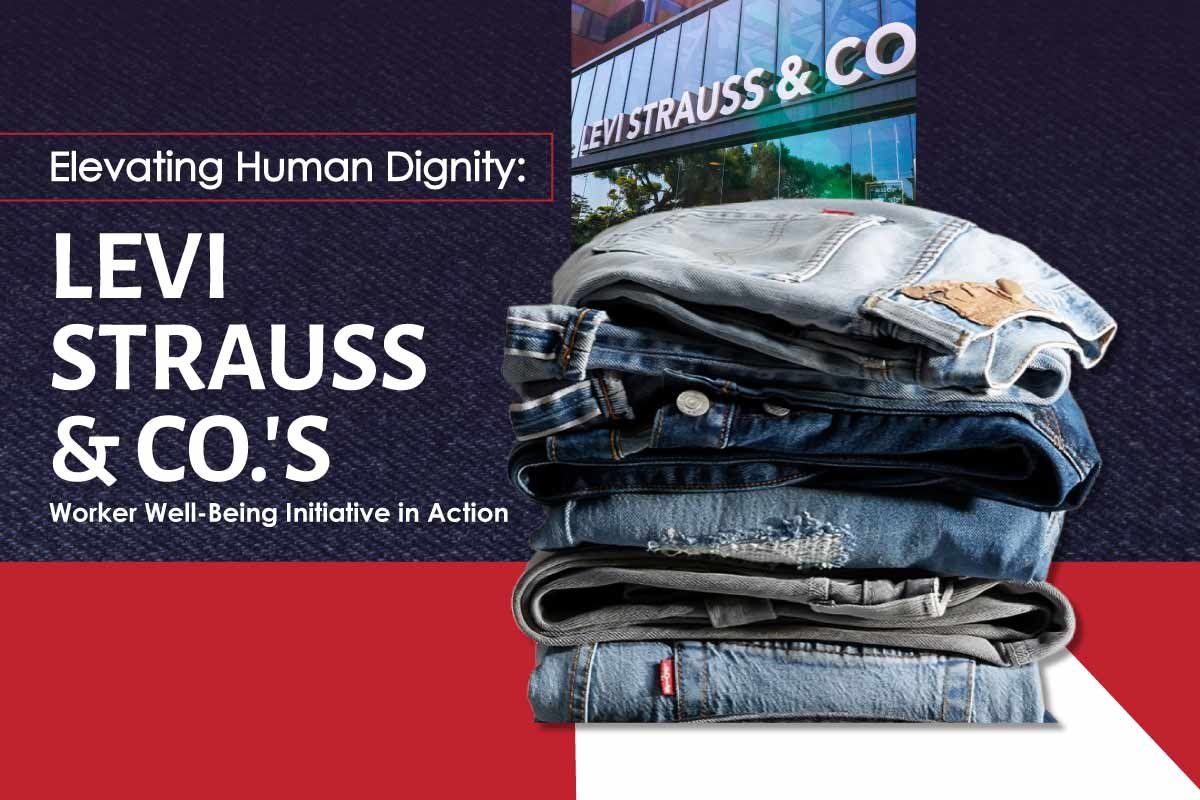Levi Strauss & Co. (LS&Co.) is a company whose name is synonymous with timeless American style and the rugged, enduring spirit of the blue jean. Founded in 1853 in San Francisco, California, by Levi Strauss, the brand has evolved from providing durable workwear during the Gold Rush to becoming a global fashion icon. Today, LS&Co. is one of the world’s largest apparel companies, operating across nearly 110 countries with an unparalleled legacy of innovation and cultural relevance. LS&Co. Vision: “To make a positive impact on people and the planet through our core business activities.”
While famous for its product, Levi Strauss & Co. carries an equally profound commitment to social responsibility, a value woven into the fabric of its operations. Among its most transformative initiatives is the Worker Well-Being (WWB) Initiative, launched in 2011. This initiative stands as the cornerstone of LS&Co.’s ethical sourcing, extending beyond mere compliance to proactively improve the lives of the people who make its products. The WWB Initiative is a holistic, facility-based program designed to empower garment workers globally, ensuring they have access to essential health, financial, and safety resources. It operationalizes LS&Co.’s mission: to drive profitable business growth while making a positive impact on workers and their communities.
“Profit with Principle: Investing in the People Who Make Our Clothes”
| Levi Strauss & Co. Worker Well-Being | |
|---|---|
| Metric | Detail |
| Workers Reached Globally | Over 225,000+ |
| Manufacturing Facilities Involved | 100+ across 12 countries |
| Target: Percentage of Product Volume Covered | 80% by 2025 |
| Key Focus Areas | Health, Financial Security, Education, Gender Equity |
| Partners | NGOs, Local Suppliers, Government Agencies |
The Foundational Pillars: A Model for Industry-Wide Empowerment

The Levi Strauss & Co. Worker Well-Being Initiative is a comprehensive, multi-faceted strategy that moves beyond traditional auditing by fostering a true partnership between LS&Co., its suppliers, and local non-governmental organizations (NGOs). It is built on a simple yet profound premise: when workers thrive, business performance improves.
The initiative rigorously focuses on four critical areas, which collectively form a blueprint for sustained, high-impact social investment:
1. Health and Family Well-Being: Ensuring Foundational Stability
This pillar recognizes that a healthy workforce is a productive one. LS&Co. supports programs at supplier factories that provide workers with direct access to vital health information and services. The focus is on proactive health management and preventative care.
- Health Education: Providing workshops and resources on reproductive health, maternal care, nutrition, and hygiene.
- Access to Services: Facilitating access to subsidized or free health services, including on-site medical checkups and counseling.
- Water and Sanitation: Ensuring facilities have high standards for clean drinking water and sanitary conditions.
2. Financial Security and Capability: Building Resilience
The initiative aims to improve workers’ economic resilience by offering tools and training to manage their earnings effectively and build long-term security. This transcends simple wage compliance to empower workers as financial stewards.
- Financial Literacy Training: Offering workshops on budgeting, saving, debt management, and understanding digital finance tools.
- Access to Financial Services: Collaborating with local institutions to provide access to secure and ethical banking and micro-lending services.
- Sustainable Wages: While not a direct wage-setting program, the initiative supports industry efforts toward fair, livable wages through capability building.
3. Safety and Environment: Creating a Secure Workplace
This dimension focuses on maintaining a workplace environment that is not only compliant with safety regulations but actively promotes worker safety and environmental sustainability.
- Occupational Health and Safety (OHS): Moving beyond basic compliance to implement best-in-class safety protocols and worker training programs.
- Worker-Management Dialogue: Establishing formal channels for workers to voice concerns about safety and working conditions without fear of reprisal.
- Environmental Awareness: Educating workers on the factory’s environmental impact, such as water and energy consumption, and how they can contribute to reduction efforts.
4. Gender Equity and Empowerment: Fostering Inclusivity
Recognizing that the apparel workforce is predominantly female, this pillar is critical for social impact. It is dedicated to dismantling barriers and promoting equal opportunity for all workers.
- Gender-Sensitive Training: Programs designed to address workplace harassment, gender bias, and promote respectful communication between colleagues and management.
- Leadership Development: Targeted training to empower female workers to take on leadership roles within the factory and their community.
- Maternal Support: Implementing policies and facilities that support pregnant and new mothers, such as better maternity leave and designated on-site childcare or breastfeeding rooms.
The Direct Impact: A Measured Return on Investment

The practical success of the Worker Well-Being Initiative is evident in the measurable improvements it brings to both workers’ lives and factory performance. Levi Strauss & Co. has pioneered a model that demonstrates the economic rationale for social investment.
- Global Reach and Coverage: The program currently benefits over 225,000 workers across more than 100 facilities in 12 key sourcing countries, including Vietnam, Pakistan, and Mexico. LS&Co. aims to cover 80% of its product volume by 2025.
- Worker Outcomes: Studies have consistently shown that participating factories experience significant positive shifts in key indicators, including:
- Reduced Absenteeism: Financial literacy and health programs lead to fewer missed days.
- Improved Health: Workers report better overall health status and greater knowledge of preventative care.
- Increased Job Satisfaction: Feeling valued and supported translates directly into higher morale and loyalty.
- Business Outcomes: The initiative is a powerful tool for supplier engagement and business stability, with factories seeing:
- Higher Productivity: Healthier, more engaged workers are more efficient.
- Reduced Turnover: Workers are more likely to stay with factories that invest in their well-being, reducing training costs for suppliers.
- Stronger Worker-Management Relations: Open communication fostered by the program leads to a more harmonious workplace.
Strategic Hubs for Worker Empowerment
The initiative’s success is predicated on its localized, needs-driven approach. LS&Co. does not mandate a one-size-fits-all solution; instead, it uses a comprehensive Needs Assessment tool to identify the most critical issues facing workers at a specific facility. This data-driven approach ensures that investments are targeted and impactful.
- Needs Assessment: Data collected directly from workers (via surveys and interviews) informs the selection of specific programs (e.g., if financial literacy is a high-priority need, that program is implemented).
- Implementation: Programs are delivered through vetted, local expert NGOs, ensuring cultural relevance and maximum effectiveness.
- Measurement: Impact is continually tracked using pre- and post-intervention metrics, allowing LS&Co. to quantify the ROI on worker well-being.
Strategic Marketing Alignment: The Woven Commitment (The 4 P’s)
Levi Strauss & Co. strategically embeds its Worker Well-Being ethos directly into its market positioning, making it a critical differentiator (The 4 P’s: Product, Price, Place, and Promotion). The initiative isn’t a separate charitable venture but an integral part of the brand promise.
| Integrating Worker Well-Being into the 4 P’s | |
|---|---|
| Component | Strategic Integration with Worker Well-Being Initiative |
| Product | Positioning Levi’s apparel as “Made Responsibly,” with the brand’s commitment to worker dignity being a key element of product value and trust. |
| Price | Employing a value-based, premium pricing model that accounts for the investment in ethical sourcing and worker well-being, justifying the price with the value of social impact. |
| Place | Ensuring a global retail and e-commerce presence is supported by a traceable supply chain where investments in WWB facilities are prioritized and highlighted to consumers. |
| Promotion | Utilizing storytelling through the “Buy Better, Wear Longer” campaign and transparent corporate reporting to communicate the positive, human impact of the WWB Initiative directly to consumers. |
A Legacy Forged in Responsibility and Vision

The Levi Strauss & Co. Worker Well-Being Initiative stands as a powerful testament to the company’s long-held philosophy of “profits with principles.” Through this bold initiative, LS&Co. has successfully moved the needle from mere compliance to transformative, facility-based investment, proving that caring for the people who make the clothes is not just the right thing to do it’s smart business. By empowering over 225,000 workers through health, financial, and educational programs, the brand has solidified its role as an industry pacesetter, setting new, human-centric benchmarks for corporate responsibility in the global apparel supply chain.










